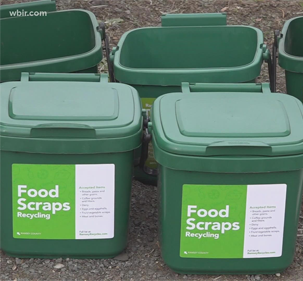
VOLOS! – COMPOST YOUR FOOD WASTE

Growing Green Cities: A Comprehensive Guide to City-Wide Composting Initiatives
As cities worldwide increasingly prioritize environmental sustainability, the establishment of city-wide composting initiatives emerges as a pivotal strategy. This comprehensive guide aims to delve into the practical aspects of implementing a realistic composting system, drawing inspiration from successful models like San Francisco, California, and other cities that have embraced composting as a fundamental step towards a greener future.
1. Soil Enrichment and Future Use: Transforming Waste into Resources
Composting extends beyond mere waste management; it’s a transformative process that yields nutrient-rich soil for various applications. Cities can envision future parks, community gardens, or green spaces flourishing from the very waste generated within their limits. San Francisco’s experience is particularly illuminating – the city’s dedication to composting has resulted in the production of high-quality compost, utilized in public landscaping projects, community gardens, and even available for purchase by residents for personal use.
2. Reusing Household and Restaurant Waste: Harnessing the Power of Organic Waste
Household and restaurant waste, often perceived as burdensome, become valuable assets in a composting initiative. Drawing inspiration from Seattle’s successful model, cities can engage households and restaurants in waste separation. Seattle’s comprehensive composting program allows residents to recycle food scraps and yard waste, significantly reducing the overall waste sent to landfills.
3. Bin Location Strategies: Making Composting Convenient for All
The strategic placement of compost bins is paramount for the success of a city-wide initiative. San Francisco’s success story lies in its widespread deployment of bins, making composting a convenient choice for residents and businesses alike. Placing bins in high-traffic areas, residential neighborhoods, and commercial districts ensures accessibility, encouraging active participation and fostering a culture of composting.
4. Awareness and Education: Cultivating a Composting Culture
Public participation is crucial for a thriving composting initiative, and comprehensive awareness and education campaigns play a key role. Following the lead of Portland, cities can launch workshops, distribute educational materials, and organize community events to instill a culture of composting. Portland’s success lies in its multifaceted approach, engaging citizens through informative campaigns that emphasize the environmental benefits of composting.
5. The Importance of Composting for the Future: Environmental Benefits and Beyond
Composting is an investment in a sustainable future with far-reaching environmental benefits. Cities can follow the example set by Austin, emphasizing reduced greenhouse gas emissions, healthier soils, and positive impacts on local ecosystems. Austin’s success in integrating composting into its waste management system showcases the transformative potential of composting for cities worldwide.
6. Engaging Businesses: Setting the Corporate Example
Engaging businesses in composting initiatives is a crucial step toward comprehensive waste reduction. Vancouver’s success lies in its commitment to involving restaurants and commercial establishments in composting systems. This not only diverts significant organic waste but also sets an example of corporate responsibility, encouraging widespread adoption within the community.
7. Community Participation and Monitoring: Fostering a Sense of Shared Responsibility
Encouraging community participation through local composting groups fosters a sense of shared responsibility. Boulder’s approach, involving the community in monitoring and adjusting composting programs, ensures continuous improvement. Community engagement creates a network of composting advocates, contributing to the initiative’s long-term success.
8. Financial Incentives: Motivating Participation through Rewards
Cities can draw inspiration from successful programs in Portland and San Francisco by offering financial incentives. These could include reduced waste collection fees or tax credits for individuals and businesses actively participating in composting initiatives. Financial incentives have proven effective in motivating behavioral change and promoting the widespread adoption of composting practices.


